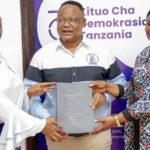Tanzania has made it clear that it will not become a refuge for those attempting to destabilize the nation through religious, ethnic, or personal agendas.
During a heated budget session in Parliament on Monday, Elibariki Kingu, Member of Parliament for Singida West, voiced strong opposition to forces he claims are trying to divide the country.
Kingu was contributing to the debate on the 2025/26 budget proposal for the Ministry of Home Affairs, where he reminded fellow lawmakers of Tanzania’s legacy in the African liberation struggles. He stressed that Tanzanians are united in protecting their homeland and will resist any efforts that threaten their peace and stability.
“We Tanzanians have pledged to guard our country jealously and at all costs against those who seek to divide us along religious or ethnic lines for their own selfish gain,” said Kingu. “These subtle provocations creeping into our nation are intolerable.”
The remarks follow recent events involving the deportation of foreign individuals suspected of interfering in Tanzania’s internal matters — moves that have stirred debate both locally and internationally. The government insists that such actions are essential to preserving national unity.
Fellow MPs voiced similar concerns. Joseph Musukuma (Geita Rural) accused foreign activists of meddling in domestic affairs, while Jesca Msambatavangu (Iringa Urban) emphasized the need to protect the country’s longstanding image as a peaceful and stable nation.
Also Read; Congo and U.S. Close to Critical Minerals Pact
Issues surrounding the welfare of security personnel were also brought to light. Kasalali Mageni (Sumve) highlighted systemic challenges such as inadequate housing and stagnated promotions within the Tanzania Police Force, urging the government to act swiftly to boost morale and efficiency.
President Samia Suluhu Hassan, in earlier statements, reaffirmed Tanzania’s commitment to human rights and peaceful governance. However, she warned that while constructive activism is welcomed, foreign interference and covert efforts to incite division will not be tolerated.
The government’s tough rhetoric comes at a time of growing political activity ahead of the 2025 general elections. With national unity at the forefront of political discourse, Tanzania’s leaders appear determined to ensure that peace remains non-negotiable — a principle deeply rooted in the country’s foundation since its independence in 1961.
As debates continue, both in Parliament and on the streets, the central message resonates: Tanzanians are ready to defend their unity, history, and identity — regardless of where threats may come from.







